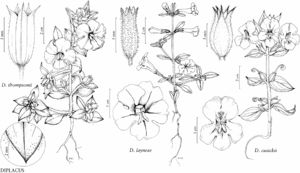Difference between revisions of "Diplacus cusickii"
Phytoneuron 2012-39: 28. 2012.
FNA>Volume Importer |
imported>Volume Importer |
||
| (3 intermediate revisions by 2 users not shown) | |||
| Line 10: | Line 10: | ||
|special_status={{Treatment/ID/Special_status | |special_status={{Treatment/ID/Special_status | ||
|code=F | |code=F | ||
| − | |label= | + | |label=Illustrated |
}}{{Treatment/ID/Special_status | }}{{Treatment/ID/Special_status | ||
|code=E | |code=E | ||
| Line 18: | Line 18: | ||
|name=Eunanus cusickii | |name=Eunanus cusickii | ||
|authority=Greene | |authority=Greene | ||
| + | |rank=species | ||
|publication_title=Pittonia | |publication_title=Pittonia | ||
|publication_place=1: 36. 1887 | |publication_place=1: 36. 1887 | ||
| Line 24: | Line 25: | ||
|name=Mimulus cusickii | |name=Mimulus cusickii | ||
|authority=(Greene) Rattan | |authority=(Greene) Rattan | ||
| + | |rank=species | ||
}} | }} | ||
|hierarchy=Phrymaceae;Diplacus;Diplacus cusickii | |hierarchy=Phrymaceae;Diplacus;Diplacus cusickii | ||
| Line 49: | Line 51: | ||
-->{{#Taxon: | -->{{#Taxon: | ||
name=Diplacus cusickii | name=Diplacus cusickii | ||
| − | |||
|authority=(Greene) G. L. Nesom | |authority=(Greene) G. L. Nesom | ||
|rank=species | |rank=species | ||
| Line 63: | Line 64: | ||
|publication title=Phytoneuron | |publication title=Phytoneuron | ||
|publication year=2012 | |publication year=2012 | ||
| − | |special status= | + | |special status=Illustrated;Endemic |
| − | |source xml=https:// | + | |source xml=https://bitbucket.org/aafc-mbb/fna-data-curation/src/2e0870ddd59836b60bcf96646a41e87ea5a5943a/coarse_grained_fna_xml/V17/V17_1380.xml |
|genus=Diplacus | |genus=Diplacus | ||
|species=Diplacus cusickii | |species=Diplacus cusickii | ||
Latest revision as of 19:30, 5 November 2020
Herbs, annual. Stems erect to erect-ascending, 10–80 mm, distal internodes 2–20 mm, minutely glandular-puberulent. Leaves basal and cauline or usually cauline, relatively even-sized or gradually larger distally; petiole absent, proximal base short petiole-like, 1–5 mm; blade ovate to broadly elliptic-ovate, (10–)15–25(–35) × 4–17 mm, margins entire, plane, apex acuminate, surfaces glabrous or adaxial minutely glandular-puberulent. Pedicels 1–1.5 mm in fruit. Flowers 2 per node, or 1 or 2 per node on 1 plant, chasmogamous. Calyces symmetrically attached to pedicels, not inflated in fruit, 7–10 mm, glabrous or minutely stipitate-glandular, lobes unequal, apex linear-acuminate, sharp-pointed, ribs green distally, intercostal areas whitish. Corollas magenta or rose purple, tube yellow, throat yellow, throat and distal tube red-spotted on floor, palate ridges yellow, tube-throat 13–16(–19) mm, limb 16–24 mm diam., bilabiate. Anthers included, glabrous or sparsely hirsutulous. Styles pubescent, at least on distal 1/2. Stigmas exserted, lobes subequal. Capsules 10–15 mm.
Phenology: Flowering May–Jul.
Habitat: Slopes, canyons, washes, ditches, sand talus, diatomaceous slopes, basalt outcrops, black volcanic gravel, volcanic ash and sand, sagebrush areas.
Elevation: 800–1000 m.
Discussion
Diplacus cusickii is endemic to northern Malheur County, Oregon, and along the Snake River in Ada and Owyhee counties, Idaho. Its narrow geographic range reflects the segregation of the more widely distributed D. cusickioides.
D. M. Thompson (2005) noted that collections in northern Malheur County, Oregon, were intermediate between Mimulus cusickii and M. nanus; the type of M. cusickii is from this area and is among the narrowly endemic, supposedly putative intermediates (G. L. Nesom 2013c). These plants have abruptly and sharply acuminate leaf apices like the more widespread form traditionally identified as Diplacus cusickii; they differ in having glabrous leaf surfaces. Typical D. nanus occurs in close sympatry, without intergradation, with the populations in northern Malheur County. Because of their distinctive morphology and coherent geography, the northern Malheur County plants are reasonably recognized as a distinct species. The more widely distributed form formerly identified as D. cusickii now is identified as D. cusickioides. Populations of D. cusickii in the narrow sense along the Snake River in Ada and Owyhee counties, Idaho, may have dispersed there from the Oregon center. Some plants of D. cusickioides in the Leslie Gulch area of east-central Malheur County have somewhat reduced vestiture, approaching that of D. cusickii.
Selected References
None.
